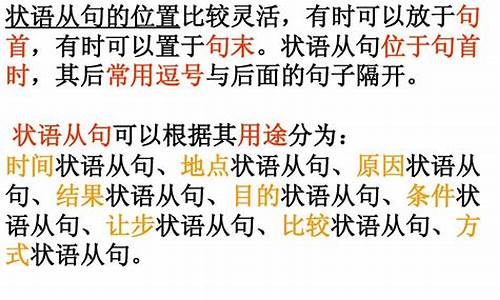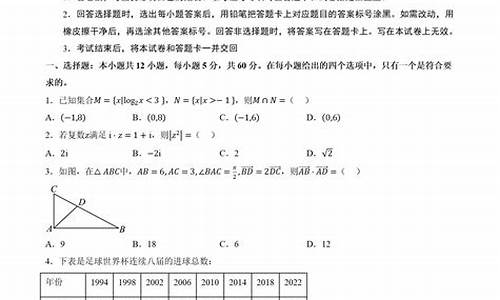您现在的位置是: 首页 > 教育资讯 教育资讯
状语从句填空高考2008_状语从句2013高考题
tamoadmin 2024-06-05 人已围观
简介1.状语从句的分类2.地点状语从句的考题解析3.一道高考题All people, they are old or young, rich or poor2答案选B,同位从的先行词是request,从句we should spend half an hour reading English every morning.不缺任何成分,故选B。相当于request的内容就是we should spend
1.状语从句的分类
2.地点状语从句的考题解析
3.一道高考题All people, they are old or young, rich or poor

2答案选B,同位从的先行词是request,从句we should spend half an hour reading English every morning.不缺任何成分,故选B。相当于request的内容就是we should spend half an hour reading English every morning.
3.答案选C,先行词是promise,同位从中包括由if引导的条件状语从句,故选,that引导同位从,if引导同位从中的条件状语从句。
4.答案选A,先行词是word(消息),参见2的解答,同位从不缺成分,填that
5.答案选B,先行词是problem。同位从中不缺成分,缺“是否"这个意思,应填wheather,注意同位从不可以用if来引导。
6.答案选B,先行词possibility,理由见1,4的解答。
7.答案选B,注意两个逗号之间的部分为条件状从,去掉不影响句子主干,可以先略去不看,于是主语是the students,谓语是are forbidden to say out.主要考查forbide的用法,forbide doing sth,forbide sb. to do sth.,sb. be forbidden to do sth
状语从句的分类
英语中为了避免重复,往往省去一个词语或更多成分,这种语法现象称为省略。省略的情况复杂、多样,综合近年来的高考题,常在以下几个方面对省略进行考查。
一、 考查状语从句中的省略
例1. When first ______to the market, theseproducts enjoyed great success. (2004高考)
A. introducing B.introduced C.introduce D.being introduced
2._____with the size of the whole earth, the biggest ocean does notseem big at all. (2004湖北)
A. Compare B.When comparing C. Comparing D.Whencompared
3.The research is so designed thatonce nothing can be done to change it. (2002年全国)
A. begins B. havingbegun C. beginning D.begun
Key:1.B 2.D 3.D
简析 状语从句中,如果主句的主语和从句的主语一致,且状语从句的谓语动词中有be动词,从句的主语连同be可一起省略,该类状语从句多为时间、地点、条件、方式或让步等,连词为when,while, though, if, unless, although, as if等,后面通常接分词、不定式、形容词、名词等。
例 Look out for cars when (you are) crossingthe street.
另外,在when /if it is necessary , possible 结构中, it is通常省略。
例 Drop in on me if (it is ) possible.
二、 考查定语从句中关系代词及关系副词的省略
例.1.That’s an unpleasant thing to say aboutyour father after _______ he’s done for you. (2004高考)
A. something B. anything C. all D.that
2. Playing tricks on others is ______we should never do.(2004湖南)
A. anything B.something C.everything D.nothing
3. What surprised me was not what he said but ___he said it. (2004湖北)
A. the way B. in the waythat C. in the way D. the way which
Key: 1.C 2.B 3.A
简析 关系代词在限制性定语从句中充当宾语且不位于介词之后可以省略;关系副词 that在先行词reason/ way后的省略。
例 This is the reason why / for which / that/省略he was late. (that 为关系副词,可省略)
三、不定式符号to 的省略
例:1.A computer does only what thinking people _________.(1999上海)
A. have it do B. have itdone C. havedone it D.having it done
2. We’ve missed the last bus. I’m afraid we have no choice but_____ a taxi. (1993上海)
A. to take B.taking C. take D.taken
Key: 1.A 2.A
简析:不定式在感官动词see, hear, feel, watch, notice, look at , listento, overhear, observe 和使役动词 have, make, let 后作宾语补足语时,不定式省略to。
例 I watched him disappear in the distance.
不定式符号to在介词but ,except, besides后的省略。介词but ,except,besides 后接不定式作宾语时,介词前有行为动词do,不定式要省去to。
例We did nothing but/except wait then.
不定式符号to作表语时的省略。当主语部分有行为动词do,作表语的不定式to可省略。
例What I want to do now is find some books to read.
四、考查不定式后动词的省略
例: 1.--- Would you like to go to the Great Theatre with metonight.
--- ______.(1999上海高考)
A. Yes, I would like to go to the Great Theater with youtonight.
B. I’d love to, but I have an exam tomorrow.
C. No, I wouldn’t D.That’s all right
2.--- Does your brother intend to studyGermany?
--- Yes, heintends ________. (1998上海高考)
A./ B.to C.so D.that
3.--- I’ll be away on a business trip. Wouldyou mind looking after my car?
--- Not atall. ________. (1995NMET)
A. I’ve no time B. I’d rathernot C. I’d likeit D. I’d behappy to
Key: 1.B 2.B 3.D
简析 动词love, mean, want, hate, like, wish,expect, hope,try, intend, plan, refuse, prefer, seem 及be glad(pleased, delighted, happy) to等后面接不定式时,为避免重复,常省略与上文相同的动词,只保留to不定式符号。
例--- How about going for a walk ?
--- I’d like to ( go for a walk ) .
句式would have done …, should have done…, ought to have done…,needn’t have done …, used to be …等省略形式为 would have ,should have , ought to have, needn’t have , used to be,要保留不定式后的be或have。
例 ---Are you a sailor ?
--- No, but I used to be (a sailor).
五、对替代词so 及not 的考查
1. --- You haven’t lost the ticket, have you?
--- ______.I know it’s not easy to get another one at the moment.(2004江苏高考)
A. I hopenot B. Yes, Ihave C. I hope so D. Yes, I’m afraidso
2. --- The boys are not doing a good job at all,are they ?
--- ________.(2003北京春)
A. I guess notso B. I don’t guess C. I don’t guessso D. I guessnot
3.--- I believe we’ve met somewhere before.
--- No, ________. (2000北京春)
A. it isn’t the same B. it can’t be true C. I don’t think so D. I’d rather not
Key: 1.A 2.D 3.C
简析 替代词so /not用于避免重复前面所说过的内容,代替肯定的名词性从句。可与动词believe, do, expect, fear, guess, hope, say, speak, suppose, think 等及I’m afraid连用。肯定时上列动词都可与so 搭配,否定时hope与guess只用I hope not 和I guess not 形式,而think ,believe , suppose等词可有两种否定形式 ,即:I think not 或I don’t think so.
例 --- Is he going to studyabroad?
--- I believe so. ( so = he is going to study abroad)
六、 考查虚拟语气中if 及should 的省略
1._____ it rain tomorrow, we would have to putoff the visit to the Yangpu Bridge. ( 1994上海 )
A. Were B. Should C. Would D.Will
2.What would have happened _______ as far as the river bank ?(2001上海高考)
A. Bob hadwalkedfarther B. if Bobshould walk farther
C. had Bobwalkedfarther D. if Bobwalked farther
3.Jane’s pale face suggested that she _____ill, and her parents suggested that she ___ a medical examination.( 1994上海高考)
A. be,should have B. was,have C. should be, had D. was,has
4.____be sent to work there ? (2002上海高考)
A. Who do you suggest B.Who do you suggest that should
C. Do you suggest whoshould D. Do yousuggest
Key: 1.B 2.C 3.B 4.A
简析 在书面语中,当条件从句有were, had, should 时省略if , 把它们提至句首,形成倒装句式。
在含有建议、要求、命令等相关的名词性从句用should + V ,should可以省略。
例 He suggested that she (should ) go atonce.
注suggest表示“暗示” 时用陈述语气
七、 会话中的省略
例: 1.---Guess what ! I came across an old friend at the party lastnight.
--- ______. I’m sure you had a wonderful time. (2004辽宁)
A. Soundsgood! B. Very well C. How nice ! D. All right!
2.--- Let’s go and have a good drink tonight.
--- _____ Have you got the first prize in the competition?(2004重庆)
A. What for ? B. Thanks alot . C. Yes, I’d liketo D. Why not?
3. ---Brad was Jane’sbrother!
--- _____ he reminded me so much of Jane ! (2004浙江)
A. No doubt B. Above all C. No wonder D. Of course
4. If you are planning to spend your moneyhaving fun this week, better ____ it —— you’ve got some bigbills coming. (2004广东高考)
A. forget B.forgot C. forgetting D. toforget
Key: 1.C 2.A 3.C 4.A
简析 省略在会话中广泛应用,解题时应按照问话或答语的具体内容补充完整,做好该类题型一是要注意上下文语境,二是要注意常见句式的省略。英语中常见句式的省略有:
1.It is … (that…) 强调句式中that部分省略。 2.(It is) No wonder … ( 难怪…)
3.(Is there) Anything else ?
4.(You’d) Better do
5.have some difficulty( in) doing, prevent sb (from) doing sth等词组中介词在口语中常省略
例: 1.--- Where did you see him last night?
--- It was in the hotel ____ he stayed.
A. where B.that C.which D. /
2. You can’t imagine the great difficulty I had _____ yourhouse.
A. finding B.found C. tofind D. find
key 1.A 2.A
简析 第1题可以补全强调句式that 部分: It was inthe hotel where he stayed that I saw him last night. hotel后为定语从句。
第2题是对have difficulty in doing sth词组置于定语从句的考查,介词in 的省略加大了该题的难度。
高考链接
1. --- Go for a picnic this weekend, OK?
--- ______. I love getting close to nature. (2004福建)
A. I couldn’t agreemore B. I’m afraid not
C. I believenot D. I don’t think so
2. --- Susan, will you please go and empty that drawer ?
--- _______? (2004 全国I 卷)
A. Whatfor B. What is it
C. How isit D. How come
3. It is easy to do the repair. ________ you need is a hammer andsome nails. (2004天津高考)
A.Something B. All
C.Both D. Everything
4. Unless ______ to speak, you should remain silent at theconference. (2003年上海春季高考)
A.invited B. inviting
C. beinginvited D. having invited
5. The man we followed suddenly stopped and looked as if____whether he was going in the right direction.(2003年北京春季)
A.seeing B. having seen
C. to haveseen D. to see
6. Though ______ money, his parents managed to send him touniversity. (2002 年上海高考)
A.lacked B. lacking of
C.lacking D. lacked in
7. When ______, the museum will be open to the public next year.(2002年 上海春季高考)
A.completed B. completing
C. beingcompleted D. to be completed
8. He made another wonderful discovery, ____ of great importance toscience. ( 1998上海高考)
A. which I think is B. which Ithink it is
C. which I thinkit D. I thinkis
9. If ________ the same treatment again, he is sure to get well.(1998年上海高考)
A.giving B.give
C.given D. beinggiven
10. --- Alice, why didn't you come yesterday?
---I ________, but I had an unexpected visitor. (1997NMET)
A.had B. would
C. was goingto D.did
Key: 1-5.AABAA 6-10. CAACC
综上所述,高考对省略的考查主要对状语从句中的省略、不定式的省略、否定问句的省略回答、虚拟条件句中if的省略及比较级的省略的考查。只有掌握了常见的省略现象及其考查形式,才能以不变应万变,在高考中立于不败之地。
地点状语从句的考题解析
1.时间状语从句
2.地点状语从句
3.原因状语从句
4.条件状语从句
5.目的状语从句
6.让步状语从句
7.比较状语从句
8.方式状语从句
9.结果状语从句
1. 时间状语从句
常用引导词:when, as, while, as soon as, before, after, since , till, until
特殊引导词:the minute, the moment, the second, every time, the day,the instant, immediately , directly, no sooner … than, hardly …when, scarcely … when
I didn’t realize how special my mother was until I became an adult.
While John was watching TV, his wife was cooking.
The children ran away from the orchard(果园), the moment they saw the guard.
No sooner had I arrived home ,then it began to rain.
Every time I listen to your advice, I get into trouble.
2. 地点状语从句
常用引导词:where
特殊引导词:wherever, anywhere, everywhere
Generally, air will be heavily polluted where there are factories.
Wherever you go, you should work hard.
地点状语从句一般由连接副词where, wherever等引导,已经形成了固定的句型,例如:
句型1:Where+地点从句,(there)+主句。
注意此句型通常译成“哪里……哪里就……”;主句在从句后面时,there可用可不用;如果主句在从句的前面时,一般都不用there。例如:
Where there is no rain, farming is difficult or impossible.在没有雨水的地方,耕作是困难的,或根本不可能的。
They were good persons. Where they went, there they were warmly welcomed. 他们都是好人。因此他们走到哪里都受到热烈欢迎。
You should have put the book where you found it. 你本来应该把书放回原来的地方。
Where the Communist Party of China goes, there the people are liberated.哪里有了中国***,哪里人民得解放。
句型2:Anywhere/ wherever+地点从句,+主句。
注意anywhere本身是个副词,但是,常可以引导从句,相当于连词,意思相似于wherever, anywhere引导的从句可位于主句之前,也可以位于主句之后。 而wherever本身就是个连词,表示“在何处,无论何处”。例如:
Wherever the sea is , you will find seamen.有海就有海员。
3. 原因状语从句
常用引导词:because, since, as, for
特殊引导词:seeing that, now that, in that, considering that, given that.
My friends dislike me because I’m handsome and successful.
Now that everybody has come, let’s begin our conference.
The higher income tax is harmful in that it may discourage people from trying to earn more.
4. 目的状语从句
常用引导词:so that, in order that
特殊引导词:lest, in case, for fear that,in the hope that, for the purpose that, to the end that
The boss asked the secretary to hurry up with the letters so that he could sign them.
The teacher raised his voice on purpose that the students in the back could hear more clearly.
5. 结果状语从句
常用引导词:so … that, such … that,
特殊引导词:such that, to the degree that, to the extent that, to such a degree that,
He got up so early that he caught the first bus.
It’s such a good chance that we must not miss it.
To such a degree was he excited that he couldn’t sleep last night.
6. 条件状语从句
常用引导词:if, unless,
特殊引导词:as/so long as, only if, providing/provided that, supposing that, in case that, on condition that
We’ll start our project if the president agrees.
You will certainly succeed so long as you keep on trying.
Provided that there is no opposition, we shall hold the meeting here.
7. 让步状语从句
常用引导词:though, although, even if, even though
特殊引导词: as(用在让步状语从句中必须要倒装),while ( 一般用在句首 ),no matter …, in spite of the fact that, while, whatever, whoever, wherever, whenever, however, whichever
Much as I respect him, I can’t agree to his proposal.
尽管我很尊敬他, 我却不同意他的建议。
The old man always enjoys swimming even though the weather is rough.
No matter how hard he tried, she could not change her mind.
He won’t listen whatever you may say.
8. 比较状语从句
常用引导词:as(同级比较), than(不同程度的比较)
特殊引导词:the more … the more … ; just as …, so…; A is to B what /as X is to Y; no … more than; not A so much as B
She is as bad-tempered as her mother.
The house is three times as big as ours.
The more you exercise, the healthier you will be.
Food to men is what oil is to machine. 食物之于人,犹如油之于机器。
9. 方式状语从句
常用引导词:as, as if, how
特殊引导词:the way
When in Rome, do as the Roman do.
She behaved as if she were the boss.
Sometimes we teach our children the way our parents have taught us.
10. 状语从句的简化
状语从句的省略状语从句同时具备下列两个条件:①主句和从句的主语一致,或从句主语为it;②从句主要动词是be的某种形式。从句中的主语和be动词常可省略。例如:
When ( the museum is ) completed , the museum will be open to the public next year .
He’ll go to the seaside for his holiday if (it is ) possible.
另外,比较状语从句经常省略。例如:
I’m taller than he (is tall ).
The higher the temperature (is), the greater the pressure (is ).
就状语从句而言,有时为了使语言言简意赅,常常将状语从句进行"简化"。状语从句的"简化"现象在口语中较为普遍,而且在高考中的复现率也较高。因此,有必要对其进行全面、透彻的了解。
状语从句的"简化"现象常存在于以下五种状语从句中:①由if, unless等引导的条件状语从句;②由although, though, even if / though等引导的让步状语从句;③由when, while, as, before, after, until / till等引导的时间状语从句;④由as, as if等引导的方式状语从句;⑤由as, than等引导的比较状语从句。下面针对这五种情形作一归纳。
(1)当状语从句的主语是it,且谓语动词是be时,it和be要完全简化掉。例如:
If (it is) possible, he will help you out of the difficulty.如果可能的话,他会帮你摆脱困境。
You must attend the meeting unless (it is) inconvenient to you.除非情况对你来说不方便,否则你必须出席这次会议。
(2)当状语从句的主语和主句的主语一致时,从句可以将主语和be动词简化掉。常用于以下几种情形:
a.连词+形容词
As (he was) young, he learned how to ride a bike.他小时候就学会了骑自行车。
Whenever (she is) free, she often goes shopping.她有空就去逛商店。
Work hard when (you are) young, or you'll regret.少壮不努力,老大徒伤悲。
b.连词+名词
While (he was) a young boy, he was always ready to help others.他在孩提时代就乐于助人。
Although (he was) a farmer, now he is a famous director.尽管他曾是个农民,而现在是位著名的导演了。
c.连词+现在分词
As (she was) walking along the river bank, she was singing a pop song.她沿着河堤边走边唱着流行歌曲。
Although (he is) doing his best in maths these days, he has still got no good marks.尽管近来他一直在学数学,但他仍然没有取得好成绩。
d.连词+过去分词
He won't go there with us unless (he is) invited.除非受到邀请,否则他不会和我们一道去那里。
The concert was a great success than (it was) expected.这场音乐会出乎意料地取得了巨大成功。
e.连词+不定式
He stood up as if (he were) to say something.当时他站起来好像要说什么。
He wouldn't solve the problem even if (he were) to take charge.即使他来负责,他也解决不了这个问题。
f.连词+介词短语
She looked anxious as though (she was) in trouble.她看上去很焦急,好像遇到了麻烦。
He had mastered the English language before (he was) in the USA.他到美国之前就懂英语了。
注意:当从句主语和主句主语不一致时,从句部分要么用完全形式,要么用独立主格结构来表达。例如:
When the meeting was over, all the people went out of the meeting-room.当会议结束时,人们都走出了会议室。(=The meeting over,
一道高考题All people, they are old or young, rich or poor
[考题1] — Mom, what did the doctor say?
— He advised me to live ____ the air is fresher. (2006四川)
A. in where B. in which C. the place where D. where
[答案] D
[解析] where引导修饰谓语live的地点状语从句。
[考题2] In peace, too, the Red Cross is expected to send help ____ there is human suffering. (2006江西)
A. whoever B. however C. whatever D. wherever
[答案] D
[解析] where引导修饰谓语send的地点状语从句。
[考题3] If you are traveling ____ the customs are really foreign to your own, please do as the Romans do. (2006天津)
A. in which B. what C. when D. where
[答案] D
[解析] where引导修饰谓语are traveling的地点状语从句。
B. whether whether 引导名词从句,常与or 连用。
A. even if 即使 ,尽管
C. no matter 引导让步状语从句,no matter作“无论”、“不管”解,用以引导表示让步的状语从句,常用在下列句型中: 句型中的No matter what (who/when etc.)...分别表示“无论何事”、“无论何人”、“无论何时”等,这个从句可以置主句之前,也可以置主句之后。
D. however 然而 ,表转折









